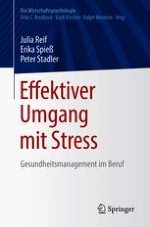2018 | OriginalPaper | Buchkapitel
9. Erholung
verfasst von : Dr. Julia A. M. Reif, Prof. Dr. Erika Spieß
Erschienen in: Effektiver Umgang mit Stress
Verlag: Springer Berlin Heidelberg
Aktivieren Sie unsere intelligente Suche, um passende Fachinhalte oder Patente zu finden.
Wählen Sie Textabschnitte aus um mit Künstlicher Intelligenz passenden Patente zu finden. powered by
Markieren Sie Textabschnitte, um KI-gestützt weitere passende Inhalte zu finden. powered by
